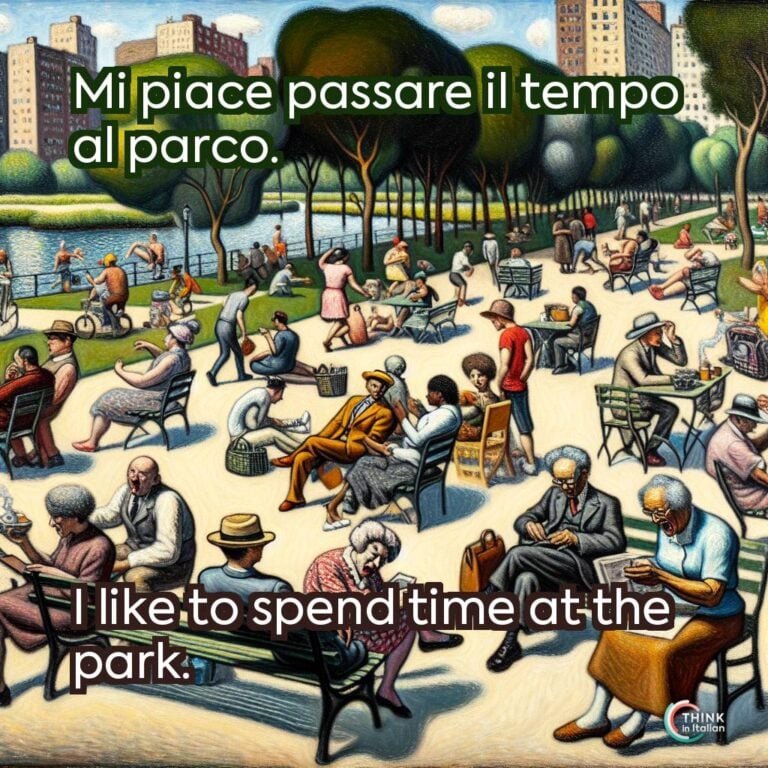How to Say “Spend Time” in Italian
Passare
The verb passare is the most frequently used way to say “spend time” in Italian. It’s versatile and works well in everyday situations, as well as in both informal and formal contexts.
Mi piace passare il tempo con la mia famiglia.
I like to spend time with my family.
Abbiamo passato il pomeriggio a chiacchierare.
We spent the afternoon chatting.
Trascorrere
While passare is more common in everyday speech, trascorrere is another verb that also means “spend time”. It tends to be used more in formal writing or contexts, or when referring to specific time periods.
Abbiamo trascorso due ore al parco.
We spent two hours at the park.
Ho trascorso le vacanze estive in Italia.
I spent the summer holidays in Italy.
It carries a slightly more formal tone than passare and is often used when you’re referring to an extended or significant amount of time.
Impegnare/Impiegare
Another verb that can be used to convey spending time is impegnare. It can easily be replaced by impiegare as both involve some form of engagement or commitment.
In fact, they typically suggest spending time on something productive or dedicated, like work or studies.
Impiego molto tempo a studiare per gli esami.
I spend a lot of time studying for exams.
Ha impegnato il suo tempo libero in attività di volontariato.
She spent her free time in volunteer activities.
Unlike the other verbs we saw so far, impegnare and impiegare imply a level of dedication or purpose in how time is spent. They are useful when you want to highlight that the time is being used for something productive or goal-oriented.
Divertirsi
A nice Italian verb I like is the reflexive verb divertirsi, which means “to have fun”. I like it because although it doesn’t literally mean “to spend time”, it’s often used in contexts where the time spent is enjoyable.
Ci siamo divertiti molto ieri sera al concerto.
We had a great time last night at the concert.
Mi diverto sempre quando trascorro del tempo con gli amici.
I always have a good time when I spend time with friends.
How to Conjugate These Verbs
In this section, I will provide you with the conjugation of the main verb tenses you might want to conjugate these verbs in, namely presente, imperfetto, passato prossimo, and futuro.
Passare
| Presente | Imperfetto | Passato Prossimo | Futuro | |
|---|---|---|---|---|
| Io | passo | passavo | ho passato | passerò |
| Tu | passi | passavi | hai passato | passerai |
| Lui/Lei | passa | passava | ha passato | passerà |
| Noi | passiamo | passavamo | abbiamo passato | passeremo |
| Voi | passate | passavate | avete passato | passerete |
| Loro | passano | passavano | hanno passato | passeranno |
Trascorrere
| Presente | Imperfetto | Passato Prossimo | Futuro | |
|---|---|---|---|---|
| Io | trascorro | trascorrevo | ho trascorso | trascorrerò |
| Tu | trascorri | trascorrevi | hai trascorso | trascorrerai |
| Lui/Lei | trascorre | trascorreva | ha trascorso | trascorrerà |
| Noi | trascorriamo | trascorrevamo | abbiamo trascorso | trascorreremo |
| Voi | trascorrete | trascorrevate | avete trascorso | trascorrerete |
| Loro | trascorrono | trascorrevano | hanno trascorso | trascorreranno |
Impegnare
| Presente | Imperfetto | Passato Prossimo | Futuro | |
|---|---|---|---|---|
| Io | impegno | impegnavo | ho impegnato | impegnerò |
| Tu | impegni | impegnavi | hai impegnato | impegnerai |
| Lui/Lei | impegna | impegnava | ha impegnato | impegnerà |
| Noi | impegniamo | impegnavamo | abbiamo impegnato | impegneremo |
| Voi | impegnate | impegnavate | avete impegnato | impegnerete |
| Loro | impegnano | impegnavano | hanno impegnato | impegneranno |
Impiegare
| Presente | Imperfetto | Passato Prossimo | Futuro | |
|---|---|---|---|---|
| Io | impiego | impiegavo | ho impiegato | impiegherò |
| Tu | impieghi | impiegavi | hai impiegato | impiegherai |
| Lui/Lei | impiega | impiegava | ha impiegato | impiegherà |
| Noi | impieghiamo | impiegavamo | abbiamo impiegato | impiegheremo |
| Voi | impiegate | impiegavate | avete impiegato | impiegherete |
| Loro | impiegano | impiegavano | hanno impiegato | impiegheranno |
Divertirsi
| Presente | Imperfetto | Passato Prossimo | Futuro | |
|---|---|---|---|---|
| Io | mi diverto | mi divertivo | mi sono divertito/a | mi divertirò |
| Tu | ti diverti | ti divertivi | ti sei divertito/a | ti divertirai |
| Lui/Lei | si diverte | si divertiva | si è divertito/a | si divertirà |
| Noi | ci divertiamo | ci divertivamo | ci siamo divertiti/e | ci divertiremo |
| Voi | vi divertite | vi divertivate | vi siete divertiti/e | vi divertirete |
| Loro | si divertono | si divertivano | si sono divertiti/e | si divertiranno |




